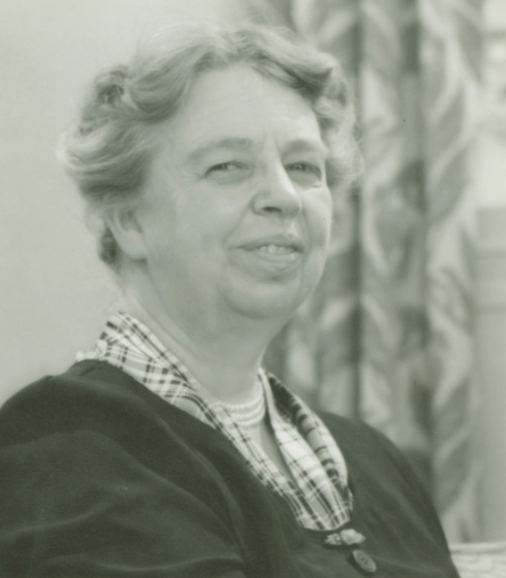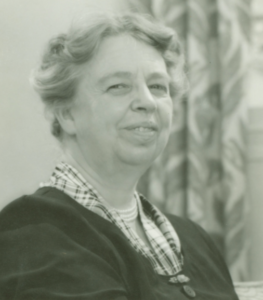Eleanor Roosevelt was a remarkable woman: a politician, diplomat, reformer, and more. She completely revolutionized the role of First Lady and changed the landscape for those who followed. Ever the champion of the underprivileged, she worked tirelessly to improve the lives of others. As such, it’s hardly surprising that she was beloved by millions around the globe.
Roosevelt’s legacy lives on in her body of work – most notably, the Universal Declaration of Human Rights. She was a driving force behind its creation through her work with the United Nations (when she was in her 60s!).
She also left behind an impressive portfolio of speeches, broadcasts, books and newspaper columns. These allow insight into the method and mindset that made Roosevelt such a force of nature. Brave, determined, compassionate and unapologetic, we could all benefit from being “a little more Eleanor.”
What better way to celebrate women’s history than by considering the life lessons that she lived by? Here are my four favorites:
1. Swap Multi-Tasking for Single-Tasking
It’s often been said that women are great multi-taskers. We’re the balancers of many plates, adept at performing multiple jobs at the same time. For a long time, this was associated with efficiency and productivity. But in recent years, the mood has shifted.
Today, many of us strive to be a little bit more mindful, and Eleanor’s approach demonstrates why.
Few people could pack as much into a day as she did, even in her elder years. She keenly avoided trying to balance multiple tasks. Whether reading, writing, speaking or listening, she gave her full attention to each task individually. This, she reflected, allowed her to get things done, but also cultivate a deep inner stillness. Roosevelt was bent on experiencing life fully, which requires one to step into the present moment.
We can only imagine what she might have thought today about the pinging of emails and phone notifications. Her advice, no doubt, would be to clear out distractions. No matter what you’re doing, do just that.
2. Adopt a Growth Mindset to Overcome Weaknesses
Most people know Roosevelt as a prolific public speaker. She hosted regular radio broadcasts, appeared on TV, and traveled across the globe to give lectures and speeches. So, it might surprise you to learn that as a child, she was painfully shy and “afraid of practically everything.” How was it that such a shy and awkward girl became one of the most vocal figures of the twentieth century? Simply put, it came down to practice.
When Franklin was diagnosed with polio in 1921, it fell upon Eleanor to speak on his behalf. Despite her initial reaction – “Oh, I could never make a speech. You mustn’t ask that of me” – she was persuaded to try by Franklin’s political advisor. Louis Howe coached and criticized her while she shook and giggled nervously. Eventually, she realized “if you have something to say, you can say it.”
Her actions embody what we know today as a “growth mindset.” Created by Dr. Carol Dweck, this mindset suggests that intelligence and skills can be learned and improved upon. Rather than retreating into a fixed mindset (i.e., I’m painfully shy and always will be), she practiced the thing that she had never done. And she got better at it!
I encourage you to follow her example by examining your skillset and practicing whatever you think you can’t do. The results might surprise you!
3. Remember You Can Do Hard Things
Roosevelt’s approach to speaking demonstrates another part of her character: her willingness to do hard things. “You gain strength, courage and confidence,” she wrote, “by every experience in which you really stop to look fear in the face.” Life taught Roosevelt that she could do the impossible by approaching it one step at a time. Those things become easier with every act of courage, and the freedom from fear proves to be exhilarating.
This may sound like an obvious message, but it’s one that’s often ignored. It’s all too tempting to avoid what we’re afraid of. The problem with this is, however, is that it breeds more fear and often results in feeling trapped and helpless.
Consider what you’re putting off and how you could liberate yourself from this fear. What steps could you take to make it seem easier? If not for today, for your future self?
4. Cultivate Curiosity and the Skill of Listening
Roosevelt approached life with a spirit of adventure and consciously developed an attitude of curiosity. She wrote that life taught her this: “If you are interested, you never have to look for new interests. They come to you.” This not only helped her foster a positive mindset, but was incredibly useful in social situations.
Previously, when she’d felt shy and awkward, her focus had been on how others might be perceiving her. This changed when she opted to be curious, making a game of asking people questions. She sought to learn all that she could and to really listen to what was said. She looked to replicate the example of her aunt, who – though almost completely deaf – was a great listener, always seeking to truly understand.
This approach allowed her to broaden her knowledge and to relax and enjoy social situations. She found there’s value in every encounter, no matter who she was talking to or what the topic was. This is also, in part, what made her so popular. She made everyone she talked to feel seen and valued.
The next time you feel a touch of shyness, consider how you might play the game. What might you ask to learn more about this person? What experiences do they have that are similar or dissimilar to your own? Get curious!
Note: The quotes above are from Eleanor Roosevelt’s book “You Learn by Living.”
 Jo Steer is a freelance writer and teacher from West Yorkshire, England. She loves history, mindfulness, cats and Jiu Jitsu.
Jo Steer is a freelance writer and teacher from West Yorkshire, England. She loves history, mindfulness, cats and Jiu Jitsu.


There are no comments
Add yours